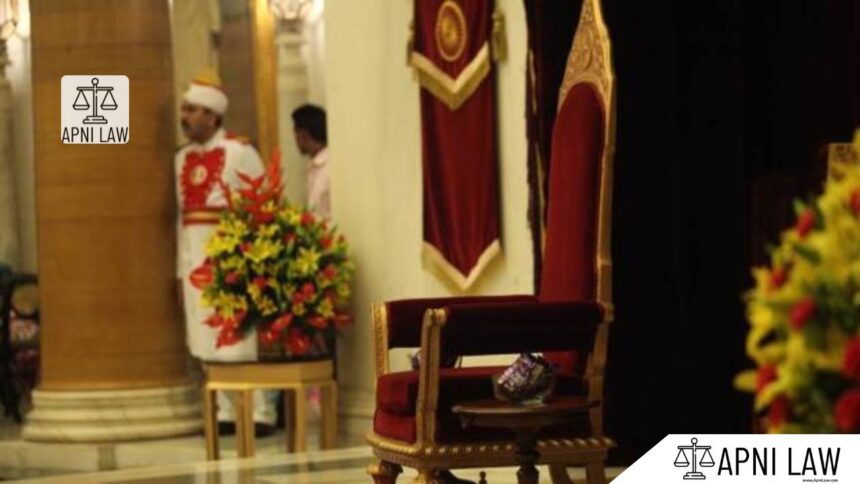Introduction
The Constitution of India gives the President a unique power to temper justice with mercy. Article 72 allows the President to pardon, commute, remit, respite, or reprieve punishments in certain cases. This power acts as a constitutional safeguard against judicial errors and provides relief in extraordinary situations. It ensures that the rigid application of law does not overshadow principles of humanity and fairness.
Article 72 applies to sentences awarded by courts-martial, offences under Union laws, and death sentences. The framers of the Constitution introduced this provision to balance the principle of justice with the need for compassion. The President, however, cannot act on personal discretion. This power must be exercised based on the advice of the Council of Ministers, particularly the Home Minister. Over time, the Supreme Court has clarified the scope, limits, and significance of this extraordinary constitutional provision.
When Can the President Use Pardoning Powers?
The President’s pardoning powers apply to specific categories of cases. First, they extend to sentences imposed by court-martial. Second, they cover offences against laws made by Parliament or Union law. Third, the President can intervene in cases involving death sentences. This last category is important because it applies regardless of whether the sentence arises under state or central law.
The framers considered these categories carefully. Court-martial cases often deal with military discipline where rigid application of law might overlook human factors. Union laws cover offences of national importance. Death sentences involve the gravest punishment, which makes the possibility of judicial error more critical. In all these cases, the President’s intervention offers a final humanitarian safeguard.
What Types of Clemency Exist Under Article 72?
The President’s power under Article 72 is not limited to granting a full pardon. It includes several forms of clemency. A pardon completely absolves the offender, removing both conviction and punishment. Commutation reduces the severity of punishment, such as changing a death penalty to life imprisonment. Remission shortens the duration of a sentence without altering its nature. Respite reduces the punishment due to special circumstances like pregnancy or disability. Reprieve gives temporary relief by delaying execution, usually to allow appeals or petitions.
These distinctions matter because each form of clemency serves a different purpose. A pardon corrects grave miscarriages of justice. Commutation and remission soften excessive punishments. Respite and reprieve bring temporary or conditional relief. Collectively, they ensure that law serves justice in both letter and spirit.
Does the President Act Independently?
The President does not exercise this power independently. The Constitution makes it clear that the President acts on the advice of the Council of Ministers. The Home Minister plays a crucial role in processing mercy petitions and recommending action. The President cannot act contrary to ministerial advice.
This design prevents the misuse of pardoning power. It keeps the authority within the democratic framework by linking it to the elected government. At the same time, the President’s position gives the final decision a symbolic and constitutional weight.
How Has the Judiciary Regulated Pardoning Powers?
The Supreme Court of India has played a central role in defining the limits of Article 72. Courts cannot substitute their decision for that of the President, but they can review the process. Judicial review applies if the decision involves arbitrariness, malice, irrelevant considerations, or undue delay.
In Maru Ram v. Union of India (1981), the Court clarified that the President must follow ministerial advice. The judgment emphasized that clemency powers should not be exercised arbitrarily. In Kehar Singh v. Union of India (1988), the Court said the President could re-examine evidence while considering mercy petitions, even if courts had already ruled. The Court also held that the President need not give reasons for granting or rejecting mercy.
In Shatrughan Chauhan v. Union of India (2014), the Court declared that inordinate delays in deciding mercy petitions could justify commuting a death sentence to life imprisonment. The judgment reflected humanitarian concerns, recognizing the mental agony of prisoners waiting for years on death row. These rulings show that while the President’s decision is largely executive, it is not beyond scrutiny.
Why Is There No Right to Oral Hearing?
The Supreme Court has clarified that petitioners do not have the right to an oral hearing before the President. Mercy petitions are considered based on written submissions, official records, and recommendations. The absence of oral hearings keeps the process administrative rather than judicial.
This approach avoids turning the President into another layer of judicial review. Instead, the pardoning power remains a humanitarian tool that balances justice with compassion.
What Are the Practical Significances of This Power?
The pardoning power serves several practical purposes. It acts as a safety valve against rigid judicial processes. Courts may make mistakes or deliver excessively harsh punishments. The President’s intervention can correct these errors. It also helps address humanitarian concerns in cases involving old age, illness, or extraordinary delay.
Another practical use is in cases with political or social sensitivity. The President’s decision can defuse tensions or serve broader public interests while staying within constitutional limits. For example, mercy petitions in death penalty cases often attract widespread public debate. The President’s role provides a final authoritative closure.
How Does Article 72 Compare with Governor’s Power Under Article 161?
The Constitution also gives Governors the power to grant pardons under Article 161. However, the scope is narrower. Governors cannot pardon death sentences. They also cannot intervene in court-martial cases. Their powers apply only to offences against state laws. By contrast, the President’s power extends to all three categories, making it wider and more comprehensive.
This distinction reflects the federal structure of India. Governors deal with state matters, while the President handles issues with national importance or cases involving the highest form of punishment.
Why Do Mercy Petitions Face Delays?
A common criticism of Article 72 is the delay in deciding mercy petitions. Files move through multiple layers, from state governments to the Home Ministry and finally to the President. Political considerations, bureaucratic inefficiency, and public pressure often slow the process.
These delays have serious consequences, especially for death row convicts. The mental agony of waiting for years creates additional punishment beyond the court’s sentence. Recognizing this, the Supreme Court has commuted many death sentences where mercy petitions remained pending for long periods.
What Is the Balance Between Justice and Mercy?
Article 72 represents the balance between the rule of law and compassion. Courts administer justice according to law, but justice sometimes needs a human touch. By granting pardons and commutations, the President ensures that law does not become blind to humanity.
This balance strengthens public confidence in the legal system. Citizens know that if harshness of law produces injustice, the Constitution provides a remedy at the highest level. In this way, Article 72 acts as both a safeguard and a symbol of humane governance.
For any specific query call at +91 – 8569843472
Conclusion
Article 72 gives the President of India a powerful constitutional role in the criminal justice system. The power to pardon, commute, remit, respite, or reprieve ensures that justice does not lose sight of mercy. It corrects judicial errors, prevents excessive punishment, and addresses humanitarian concerns.
The President exercises this power only on ministerial advice, ensuring democratic accountability. Judicial review prevents arbitrary or mala fide use. Landmark cases like Maru Ram, Kehar Singh, and Shatrughan Chauhan show how the courts have balanced executive discretion with constitutional safeguards.
In practice, Article 72 is more than a legal provision. It is a safety valve that protects against the inflexibility of law and offers hope in the gravest situations. It reflects the philosophy that justice in India is not only about punishment but also about compassion.








